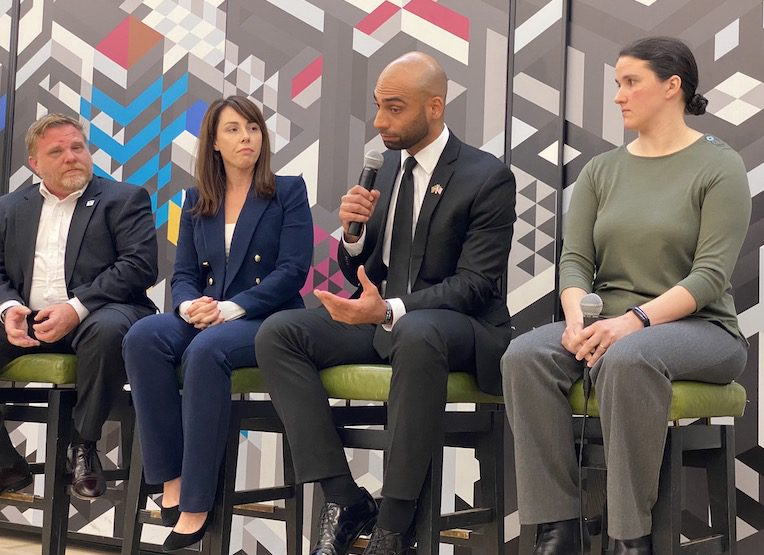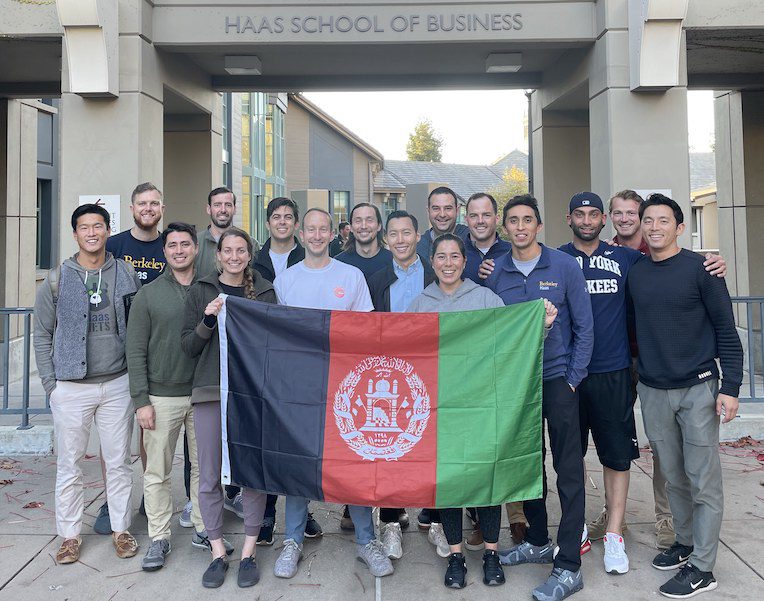
Junaid Lughmani, MBA 23, was honored by the Pat Tillman Foundation last week for his work on “Digital Dunkirk,” a massive online effort by military veterans to help evacuate at-risk Afghans following the U.S. withdrawal from Afghanistan.
The annual Tillman Honors are named for Pat Tillman, the former NFL player who tragically died in Afghanistan while serving in the U.S. Army in 2004. The event gathered hundreds of supporters, investors, Tillman Scholars, and others in Chicago on Nov. 4 to celebrate Tillman’s legacy of service and leadership. The Foundation’s 2021 Champion Award went to Afghan politician and women’s rights activist Fawzia Koofi. Previous Champion award recipients include Sen. John McCain and former U.S. Rep. Gabrielle Giffords & Sen. Mark Kelly.
Lughmani, Kate Hoit, and Rick Schumacher, who are among 60 Tillman Scholars chosen in 2021, accepted the “Make Your Mark” award on behalf of the Digital Dunkirk organizers. The Washington Post featured Lughmani’s work with former Green Beret Jon Reed in Berkeley in an Aug. 26 article. The pair joined veterans, active-duty service members, former government officials, and civil servants who volunteered to help Afghans flee Taliban retaliation.
How do we value hope?
Lughmani, a first-generation American of Pashtun origin, worked as an interpreter in Afghanistan from 2009 to 2012, serving as a liaison between the U.S. and Afghan governments. He later returned to Afghanistan with the U.S. Army as an infantry officer, leading his platoon on multiple combat missions.
In his speech during the awards ceremony, Lughmani said that while in Afghanistan he received “the greatest gifts of love, generosity, care, and goodness from the people.” “From the children who would call me “kaka” (uncle) to the elders who treated me as their own son, Afghans embraced us, broke bread with us, and truly taught us the power of human connection.”
Watch Junaid Lughmani’s speak during the annual Tillman Honors (begins at 39:57 minutes.)
Lughmani, who sought an MBA with a plan to return to Afghanistan as an investor to help grow the country’s entrepreneurial ecosystem, spoke of how torn he was in the days when he began his MBA classes as the Taliban reclaimed power in Afghanistan.
“As I sat through valuation lecturers and read through spreadsheets and assessments I wondered: how do we value hope?” he said. “Our dreams cannot be summed up by a formula in a little box. Our hearts belong in the in-between spaces. The Afghans who changed my life stepped out into the in-between spaces. If they could do that, given all they were up against, I decided that I would also choose the in-between spaces. I’d work with whoever showed up, to help as many people as we could.”
With winter fast approaching, more than half the population of Afghanistan is at risk of running short of food.
“The evacuation efforts are ongoing, and there is a desperate food crisis in Afghanistan with 23 million people at risk of facing starvation through the winter,” Lughmani said. “But refugees also need our help. There are over 50,000 refugees who are currently housed on U.S. military installations across the U.S. with little to no belongings; many possess only the clothing on their backs and about half of these refugees are children.”
Uniting B-school forces
Responding to military housing conditions, Lughmani and fellow members of the Haas Veterans Club launched a drive to collect clothing, household appliances, toys, personal care items, electronics, books, and baby supplies, for relocated Afghan refugees in Northern California.

So far, they’ve collected over 3,000 items, Lughmani said. “Our donations go directly to refugees, cutting through the red tape typical of NGOs that have a more complicated aid-delivering process,” he said. “Our way enables us to identify communities that need help and respond directly through our military, veteran, and Afghan networks.”
The club is reaching out to veterans at other business schools nationwide to expand the effort. To date, veterans’ groups at Stanford’s Graduate School of Business, NYU Stern, USC’s Marshall School of Business, University of Michigan’s Ross School of Business, University of Virginia’s Darden School of Business, UCLA’s Anderson School of Business, University of Chicago’s Booth School of Business, and Northwestern’s Kellogg School of Business have signed on, and conversations continue with more schools.
The Berkeley Haas collection drive, located on the second floor of Chou Hall, is planned until Nov. 19, but may continue through the holidays, depending on need.